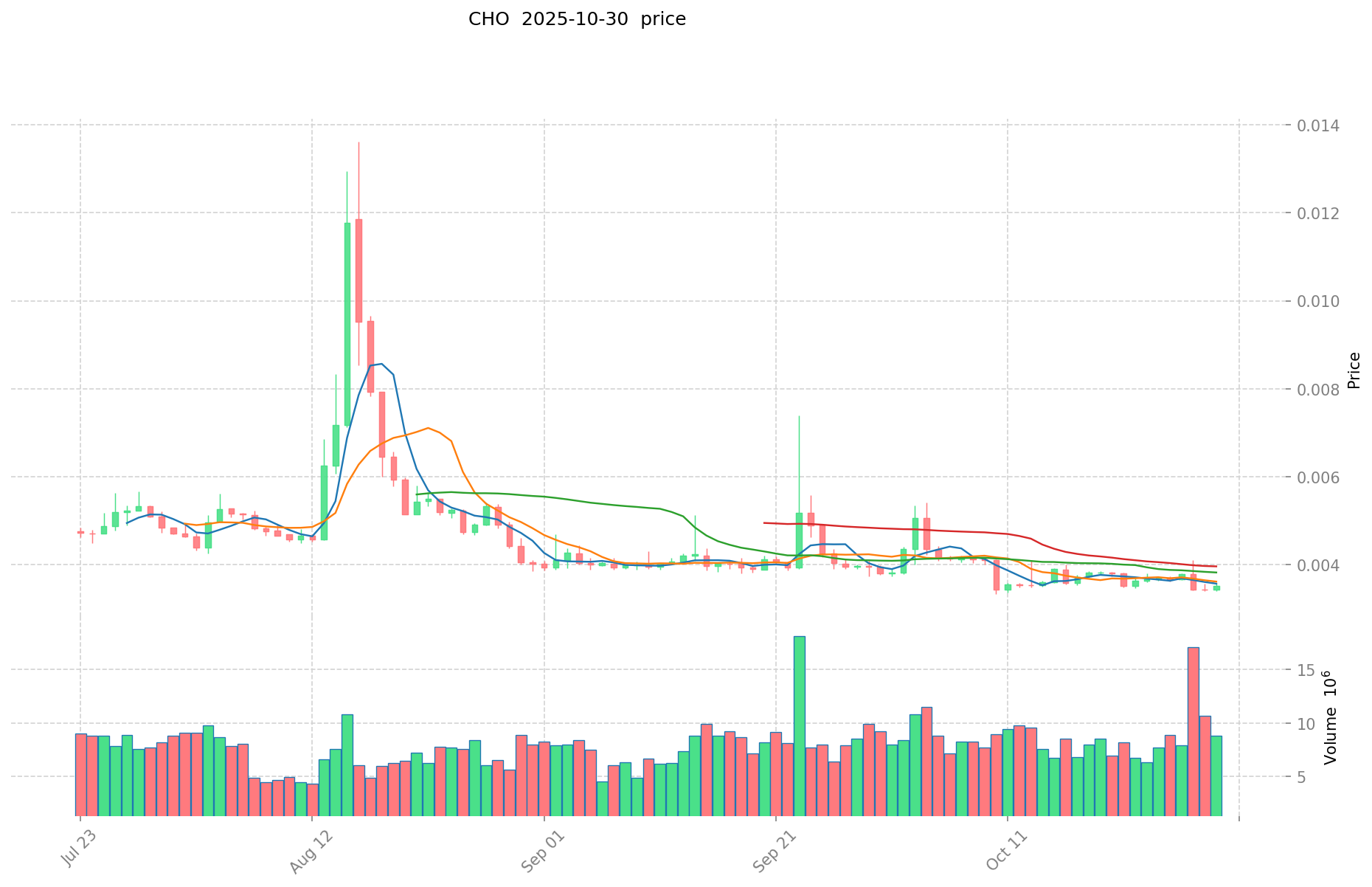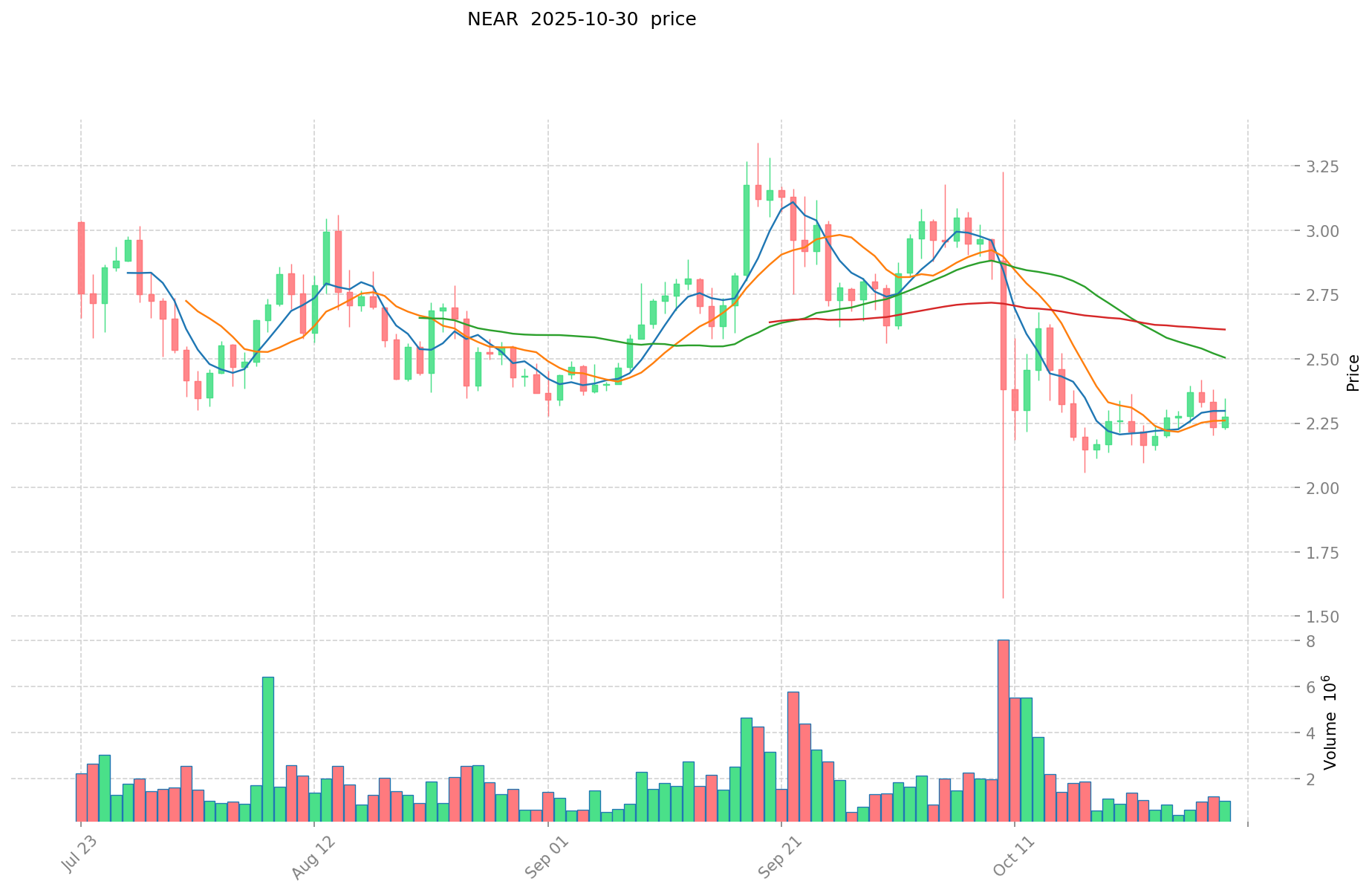CHO vs NEAR: Comparing Two Promising Biofuel Production Methods for a Sustainable Future
Introduction: Investment Comparison of CHO vs NEAR
In the cryptocurrency market, the comparison between Choise (CHO) vs NEAR (NEAR) has always been an unavoidable topic for investors. The two not only show significant differences in market cap ranking, application scenarios, and price performance, but also represent different positioning in crypto assets.
Choise (CHO): Since its launch in 2017, it has gained market recognition for its pioneering role in blockchain B2B enterprise operations.
NEAR (NEAR): Since its inception, it has been hailed as a highly scalable basic protocol ensuring fast support for DApp operations on mobile devices.
This article will comprehensively analyze the investment value comparison between CHO and NEAR, focusing on historical price trends, supply mechanisms, institutional adoption, technological ecosystems, and future predictions, attempting to answer the question investors care about most:
"Which is the better buy right now?"
I. Price History Comparison and Current Market Status
CHO and NEAR Historical Price Trends
- 2022: CHO reached its all-time high of $1.38 on September 1, 2022.
- 2022: NEAR hit its all-time high of $20.44 on January 17, 2022.
- Comparative Analysis: During the market downturn, CHO dropped from its peak of $1.38 to a low of $0.00320362, while NEAR declined from $20.44 to a current price of $2.07.
Current Market Situation (2025-10-31)
- CHO current price: $0.003484
- NEAR current price: $2.07
- 24-hour trading volume: CHO $20,875.63 vs NEAR $3,564,622.58
- Market Sentiment Index (Fear & Greed Index): 34 (Fear)
Click to view real-time prices:
- View CHO current price Market Price
- View NEAR current price Market Price


Investment Value Core Factors: CHO vs NEAR
I. Sustainable Management and ESG Integration
Sustainable Investment Principles
- ESG factors should be considered throughout the investment process, from development and evaluation to decision-making and post-investment management
- This approach enhances investment value and promotes healthy development of both companies and their invested businesses
- Executive oversight is critical, with general managers typically responsible for monitoring responsible investment practices
Corporate Governance Impact
- Corporate governance has emerged as a core factor in enhancing company value
- Research indicates strong correlation between governance quality and investment outcomes
- Governance structures directly influence R&D spending and capital expenditure decisions
II. Innovation and Technology Development
Climate Policy and Innovation Investment
- Climate policy uncertainty significantly impacts innovation investment decisions
- Research shows climate policy uncertainty can crowd out green innovation investments
- Physical investment options are affected by policy uncertainty, impacting overall productivity
Research and Development Focus
- Investment in R&D represents a core value driver
- Private sector capability development is increasingly crucial for technological advancement
- Technology standards establishment creates innovation demand and affects investment value
III. Value Chain Integration
Global Value Chain Positioning
- Integration into global value chains significantly affects investment value
- Comparative and competitive value-added chains determine long-term investment potential
- Position within industrial clusters impacts upgrading opportunities
Market-Oriented Systems
- Investment value correlates with market-oriented innovation systems
- Enterprise-led innovation ecosystems generally demonstrate stronger investment outcomes
- Private sector development enhances innovation incentives and investment value
IV. Political Economy Considerations
Policy Stability and Implementation
- Political factors significantly influence industrial policy effectiveness
- Policy implementation capacity varies considerably between countries
- Administrative capability investments correlate with successful policy outcomes
- Policies aligned with local political constraints show higher success rates
III. 2025-2030 Price Prediction: CHO vs NEAR
Short-term Forecast (2025)
- CHO: Conservative $0.00253 - $0.00352 | Optimistic $0.00352 - $0.00471
- NEAR: Conservative $1.78 - $2.06 | Optimistic $2.06 - $2.35
Mid-term Forecast (2027)
- CHO may enter a growth phase, with expected price range of $0.00429 - $0.00580
- NEAR may enter a consolidation phase, with expected price range of $2.54 - $2.89
- Key drivers: Institutional capital inflow, ETF, ecosystem development
Long-term Forecast (2030)
- CHO: Base scenario $0.00614 - $0.00705 | Optimistic scenario $0.00705 - $0.00987
- NEAR: Base scenario $1.84 - $3.60 | Optimistic scenario $3.60 - $3.75
Disclaimer: This analysis is based on historical data and market projections. Cryptocurrency markets are highly volatile and unpredictable. This information should not be considered as financial advice. Always conduct your own research before making investment decisions.
CHO:
| 年份 | 预测最高价 | 预测平均价格 | 预测最低价 | 涨跌幅 |
|---|---|---|---|---|
| 2025 | 0.00471278 | 0.003517 | 0.00253224 | 0 |
| 2026 | 0.0048144213 | 0.00411489 | 0.0027569763 | 18 |
| 2027 | 0.005804052345 | 0.00446465565 | 0.004286069424 | 28 |
| 2028 | 0.007239439136475 | 0.0051343539975 | 0.00359404779825 | 47 |
| 2029 | 0.007919227605744 | 0.006186896566987 | 0.005691944841628 | 77 |
| 2030 | 0.009874286920912 | 0.007053062086365 | 0.006136164015138 | 102 |
NEAR:
| 年份 | 预测最高价 | 预测平均价格 | 预测最低价 | 涨跌幅 |
|---|---|---|---|---|
| 2025 | 2.35296 | 2.064 | 1.77504 | 0 |
| 2026 | 3.2464656 | 2.20848 | 1.1704944 | 6 |
| 2027 | 2.891121168 | 2.7274728 | 2.536549704 | 31 |
| 2028 | 4.01729468712 | 2.809296984 | 2.47218134592 | 35 |
| 2029 | 3.7887583774716 | 3.41329583556 | 2.0138445429804 | 64 |
| 2030 | 3.745068190776432 | 3.6010271065158 | 1.836523824323058 | 73 |
IV. Investment Strategy Comparison: CHO vs NEAR
Long-term vs Short-term Investment Strategies
- CHO: Suitable for investors focused on B2B enterprise operations and ecosystem potential
- NEAR: Suitable for investors interested in scalable basic protocols and DApp support
Risk Management and Asset Allocation
- Conservative investors: CHO: 30% vs NEAR: 70%
- Aggressive investors: CHO: 60% vs NEAR: 40%
- Hedging tools: Stablecoin allocation, options, cross-currency portfolios
V. Potential Risk Comparison
Market Risk
- CHO: Higher volatility due to lower market cap and trading volume
- NEAR: Susceptible to broader cryptocurrency market trends
Technical Risk
- CHO: Scalability, network stability
- NEAR: Centralization of computing power, security vulnerabilities
Regulatory Risk
- Global regulatory policies may have different impacts on both tokens
VI. Conclusion: Which Is the Better Buy?
📌 Investment Value Summary:
- CHO advantages: Pioneering role in blockchain B2B enterprise operations, potential for growth
- NEAR advantages: Highly scalable basic protocol, fast support for DApp operations on mobile devices
✅ Investment Advice:
- New investors: Consider a balanced approach with a higher allocation to NEAR due to its larger market cap and higher liquidity
- Experienced investors: Explore a diversified portfolio including both CHO and NEAR, adjusting based on risk tolerance and market conditions
- Institutional investors: Conduct thorough due diligence on both projects, considering long-term potential and ecosystem development
⚠️ Risk Warning: The cryptocurrency market is highly volatile, and this article does not constitute investment advice. None
VII. FAQ
Q1: What are the main differences between CHO and NEAR? A: CHO focuses on blockchain B2B enterprise operations, while NEAR is a highly scalable basic protocol for DApp support on mobile devices. CHO has a lower market cap and trading volume, while NEAR has a larger market presence and liquidity.
Q2: Which token has shown better price performance historically? A: NEAR has shown better historical price performance, reaching an all-time high of $20.44 in January 2022, compared to CHO's all-time high of $1.38 in September 2022.
Q3: What are the projected price ranges for CHO and NEAR in 2030? A: For CHO, the base scenario projects $0.00614 - $0.00705, with an optimistic scenario of $0.00705 - $0.00987. For NEAR, the base scenario projects $1.84 - $3.60, with an optimistic scenario of $3.60 - $3.75.
Q4: How should investors allocate their portfolio between CHO and NEAR? A: Conservative investors might consider allocating 30% to CHO and 70% to NEAR, while aggressive investors might opt for 60% CHO and 40% NEAR. However, allocation should be based on individual risk tolerance and market conditions.
Q5: What are the main risks associated with investing in CHO and NEAR? A: Both tokens face market risks, technical risks, and regulatory risks. CHO has higher volatility due to its lower market cap, while NEAR is more susceptible to broader cryptocurrency market trends. Technical risks include scalability issues for CHO and potential centralization concerns for NEAR.
Q6: Which token is more suitable for new investors? A: New investors might consider a higher allocation to NEAR due to its larger market cap and higher liquidity, which potentially offers more stability. However, a balanced approach including both tokens could also be considered depending on individual risk appetite.
Q7: How do ESG factors and sustainable management principles affect the investment value of these tokens? A: ESG factors and sustainable management principles are increasingly important in evaluating investment value. While specific data for CHO and NEAR is not provided, investors should consider how each project addresses sustainability, corporate governance, and social responsibility as part of their due diligence process.
Share
Content